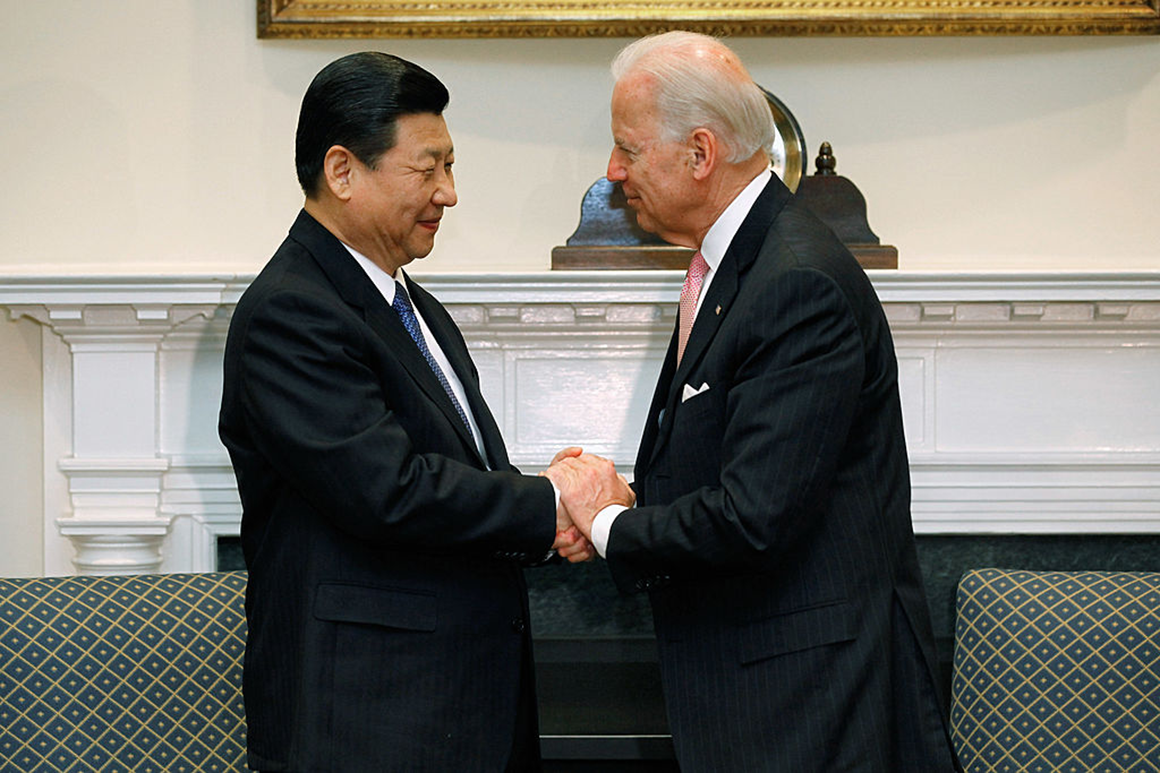
A much-anticipated virtual summit between President Joe Biden and Chinese leader Xi Jinping will take place on Monday evening, the White House confirmed.
The summit presents the biggest opportunity yet to reset the increasingly fraught bilateral relationship.
Although no major breakthroughs are expected on hot-button issues — including tensions over Taiwan, the mostly Muslim region of Xinjiang, and Hong Kong — the meeting could produce initiatives on a range of issues, including easing of visa restrictions, the creation of a bilateral nuclear weapons dialogue and a possible framework to ease trade frictions.
"The two leaders will discuss ways to responsibly manage the competition between the United States and the [People's Republic of China], as well as ways to work together where our interests align," White House spokesperson Jen Psaki said in a statement on Friday.
"Throughout, President Biden will make clear U.S. intentions and priorities and be clear and candid about our concerns with the PRC,” Psaki added.
Biden and Xi have spoken twice by phone this year, most recently a 90-minute conversation on Sept. 9. White House officials said earlier the two leaders would hold a virtual summit before the end of the year. POLITICO first reported earlier this week that the meeting was tentatively slated for Monday.
The two leaders telegraphed their intent to establish a positive tone for the summit via letters of congratulations both leaders sent this week to the National Committee on United States-China Relations to mark its 55th anniversary.
Xi’s letter — read by China’s ambassador to the U.S., Qin Gang, at a black-tie gala dinner — stated that “China stands ready to work with the United States to enhance exchanges and cooperation across the board.” The intent of the letter’s message was underscored by its wide reporting in Chinese state media on Wednesday.
Biden’s letter, read by committee Chair Jacob Lew at the gala, emphasized the “global significance” of the U.S.-China relationship in addressing challenges “from tackling the Covid-19 pandemic to addressing the existential threat of the climate crisis."
However, a senior administration official cast the meeting in terms of big power competition and the need for the world's two largest economies to clearly understand each other's intentions.
"As President Biden has made clear, he welcomes the stiff competition, but does not want conflict," the official said. "So, this meeting is a way for him to make sure there’s no misunderstanding on that."
At the same time, the official lowered expectations for any major announcements after the two leaders talk. That cautious approach reflects the high stakes that U.S.-China relations hold for the entire world.
"This is not about seeking specific deliverables or outcomes. This is about setting the terms of an effective competition where we are in the position to defend our values and interests and those of our allies and partners. We believe when such terms — or guardrails — are established, we can sustain a vigorous competition," the official said.
The confirmation of the summit’s date follows days of White House refusals to provide details on the agenda or its timing besides “before the end of the year.” White House officials this week have sought to lower public expectations for the summit’s outcome.
The summit comes as U.S. Trade Representative Katherine Tai and Chinese Vice Premier Liu He have been reviewing China's implementation of a phase one deal negotiated during the Trump administration. That pact includes a Chinese commitment to try to buy an additional $200 billion worth of U.S. goods in 2020 and 2021, compared to its purchases in 2017. Beijing also agreed to address a number of U.S. policy concerns in areas such as agriculture and intellectual property protection.
Tai told reporters on Wednesday that the U.S. was “getting traction” in talks with China on phase one implementation issues and expressed hope they could be finished soon. With the two-year purchase period rapidly drawing to a close, Beijing is still significantly short of reaching the $200 billion goal.
The summit will be virtual because Xi is declining invitations to attend all events outside China. National security adviser Jake Sullivan has described it as “the next best thing” to Biden’s preference of an in-person get-together.
Both sides want the summit to defuse tensions that China’s Vice Foreign Minister Xie Feng warned in July had produced a bilateral “stalemate.”
Intractable positions — Xi’s focus on “sovereignty” and Biden’s on the “rules-based international order” — mean neither side will budge beyond reiterating standard talking points on Taiwan, Hong Kong and Xinjiang.
Biden and Xi’s overwhelming priority is to avoid the overt hostility that blighted Chinese Foreign Minister Wang Yi’s meetings with Secretary of State Antony Blinken in Anchorage in March as well as subsequent confabs with Deputy Secretary of State Wendy Sherman in July and Biden’s climate envoy John Kerry in September. Both leaders must also avoid perceptions of weakness, an area where Biden is disadvantaged by partisan bickering over his domestic policy agenda.
----------------------------------------
By: Doug Palmer, Phelim Kine and Nahal Toosi
Title: Virtual Biden-Xi summit set for Monday
Sourced From: www.politico.com/news/2021/11/12/virtual-biden-xi-summit-521147
Published Date: Fri, 12 Nov 2021 14:09:33 EST
Did you miss our previous article...
https://consumernewsnetwork.com/politics-us/homer-plessy-is-the-key-toseparate-but-equal-and-on-the-road-to-pardon






